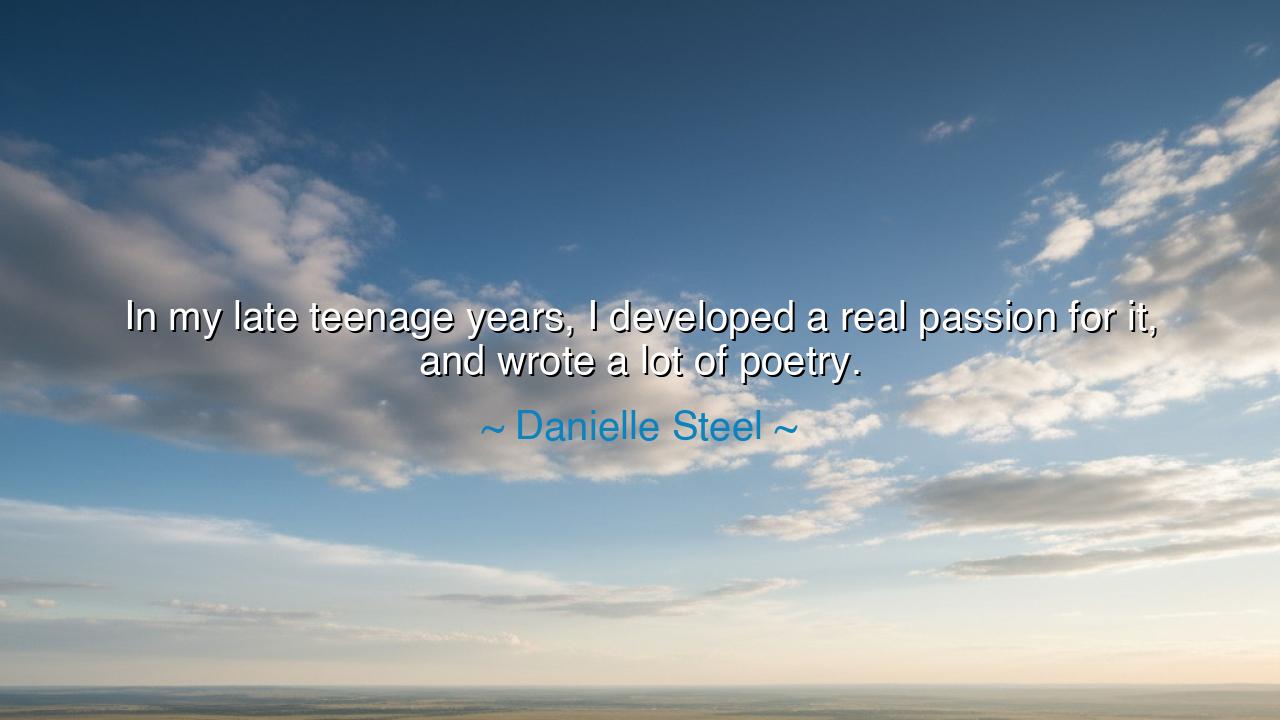
In my late teenage years, I developed a real passion for it, and
In my late teenage years, I developed a real passion for it, and wrote a lot of poetry.






“In my late teenage years, I developed a real passion for it, and wrote a lot of poetry.” Thus speaks Danielle Steel, recalling the tender season of youth when the soul first awakens to the fire of expression. These words may appear simple, but within them lies a universal truth: that adolescence, with its storms and longings, is the forge where passion for art often begins, and where the seed of creativity takes root in the heart.
The meaning of this saying rests in the way youth discovers itself. The teenage years are an age of uncertainty, a time when the self is not yet fixed, when feelings crash like waves and questions rise without answers. In such a time, many are drawn to poetry, for poetry is a vessel strong enough to hold both confusion and clarity, both despair and joy. For Steel, to write poems was not merely a pastime; it was a way of shaping her inner life, of naming the shadows and the light that struggled within her.
The origin of this passion is as old as humanity. Across centuries, young hearts have turned to verse as their first language of truth. Arthur Rimbaud, the French poet, wrote his revolutionary works before the age of twenty, blazing through youth like a comet. His poetry carried the raw intensity of adolescence, the same intensity Steel describes when she recalls her own flood of writing. Youth does not censor, does not restrain—it pours out, and poetry becomes its chosen form.
Consider also Anne Frank, who, though she is remembered for her diary, wrote poems in the secret annex where she hid. Surrounded by terror, still in her teenage years, she turned to words to capture her longing for life, love, and freedom. Her writings, like Steel’s early verses, show how adolescence often gives birth to voices that would otherwise remain unheard. In the act of writing, the young find strength to endure, clarity to grow, and courage to dream.
The lesson here is timeless: when passion awakens in youth, it must be nurtured. For the fire of the teenage heart, if ignored, may burn out into silence; but if fed with discipline and practice, it becomes the lifelong flame of vocation. Steel’s recollection is not only about her personal growth, but about the power of listening to one’s early passions. What begins as youthful poetry may blossom into novels, songs, inventions, or callings that shape the world.
Practically, this means that each of us should honor the stirrings of our youth. Remember what you loved before the world told you what was practical. Did you paint? Did you sing? Did you write verses in secret notebooks? Do not cast these passions aside as childish. Return to them, nurture them, and let them guide you still. For often, the truest voice of your soul was first spoken in the tender years of youth.
Thus, the teaching endures: poetry, born in the fires of adolescence, is not merely a youthful indulgence but a revelation of the soul’s direction. Danielle Steel reminds us that passion discovered in youth can be the foundation of a lifetime’s work. Let us then honor the poetry of our younger selves, and let it continue to guide us as we grow—so that we may live not in forgetfulness, but in fidelity to the first songs our hearts ever sang.






MC05. Minh Chau
I’m intrigued by the idea of passion emerging during the late teenage years. What triggers such a deep engagement with writing at that stage—personal experiences, intellectual curiosity, or exposure to other artists? I also question how formative the teenage years are for developing a writer’s voice. Did Danielle Steel experiment with different poetic forms and styles, or did she gravitate toward a particular voice that later shaped her approach to storytelling in novels?
MAPham Mai Anh
Reading this, I feel a mix of admiration and curiosity. Many writers discover their craft early, but how did she maintain that enthusiasm amid the challenges of growing up? Did her teenage poetry contain the seeds of the emotional depth and narrative drive found in her later work? I also wonder whether the experiences and reflections captured in youthful poetry influenced the recurring themes of love, loss, and resilience that appear in her novels.
HAHai Anh
This makes me reflect on the importance of nurturing artistic interests in adolescence. I wonder if she had mentors, teachers, or peers who encouraged her, or if her passion for writing was entirely self-driven. How significant is early creative exploration in shaping an adult career? I also question whether the act of writing poetry at that age was more about self-expression, emotional processing, or experimentation with language and form.
Hhuy
I feel curious about the transition from writing poetry to writing novels. Was poetry merely a stepping stone for her, or did it continue to influence her prose style, imagery, and rhythm? I also question whether teenage creativity reflects raw, unfiltered emotion that is later refined in adulthood. Does her early enthusiasm suggest that creative instincts are innate, or that they develop through exploration and experimentation over time?
NNThao Ngan Nguyen
It’s interesting to see a glimpse of her early life and creative development. I wonder what subjects or emotions inspired her poetry during those formative years. Did her teenage poetry foreshadow the themes and style she later became famous for in her novels? I also think about how early passion shapes long-term artistic pursuits. Could her dedication to writing in adolescence have been crucial in building the discipline and voice that eventually defined her career?